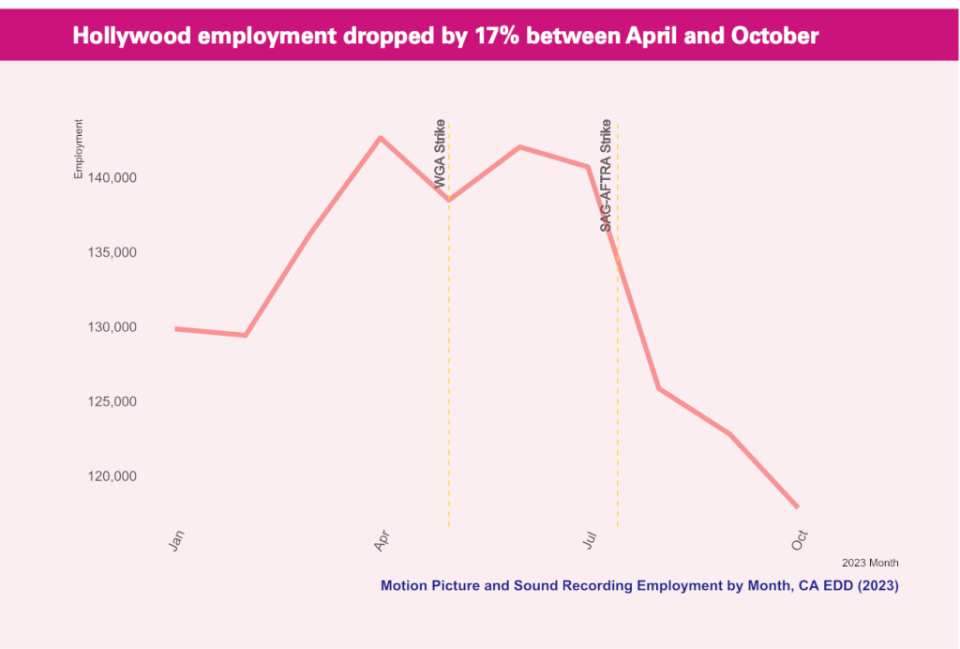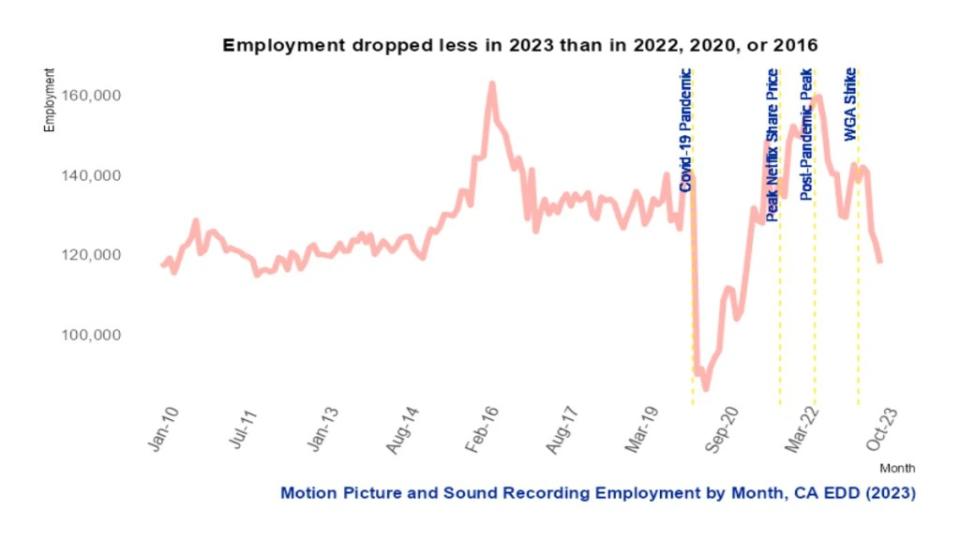Hollywood’s Slow Post-Strike Comeback is Creating a Crisis of Morale
- Oops!Something went wrong.Please try again later.
At last month’s 11th annual Make-Up Artists and Hair Stylists Guild Awards (MUAHS) at the Beverly Hilton Hotel, host Melissa Peterman won over the crowd by dancing her way onto the stage, mugging and teetering on spike heels and hitting them early on with a strike joke: “I’m so glad to be back in this beautiful room with you beautiful people and not sweating on the sidewalk with a sign that says ‘Will work for streaming bonuses!’”
The actor-comedian’s next line, however, didn’t go over quite so well. “I’m so glad that we are all back to work!” Peterman bubbled. Hairstylist Christopher Fulton, one of the evening’s nominees, told TheWrap afterward that a “collective grumble” went through the room. Peterman gamely attempted a save: “Fingers crossed,” she added brightly.
Four months after the SAG-AFTRA deal brought a definitive end to the Hollywood strikes, the return to work for many has been a disappointingly slow process. The situation is creating a crisis of morale in an industry already battered by reduced income and tensions with the major entertainment companies. But it could also usher in a wave of 90s-era innovation, industry professionals told TheWrap.
From May 2023 (when the Writer’s Guild went on strike) to October 2023, the number of workers employed in the entertainment industry in Greater Los Angeles dropped 17%, according to the November Otis College Report on the Creative Economy.
“People had expectations that it was going to be like post-COVID, we’d all be slammed,” said Toronto-based John Rakich, Location Managers Guild International President and a working below-the-line crew member. “Most of the shows that were midstream when the strike happened came back with: ‘OK, now you have to readjust your budgets.’ So it’s a slow crawl.”
A new generation struggles with a Hollywood downturn
The slow recovery is posing more of a shock to Hollywood newcomers than to those who have weathered cyclical ups and downs in the industry for decades, experts say. But even veterans of previous strikes and economic downturns seem stunned by the slow start.
The streaming boom has seen rapid advancement for many people working in the entertainment industry, “and that’s not how it used to be,” Lindsay Dougherty, principal officer of Teamsters Local 399, told TheWrap. “We have a generation of industry workers that have never seen anything like this in terms of not working.”
Rakich said the new contracts are forcing guilds to have to reassess workforce needs. Besides the red tape and additional expense of meeting new Guild minimums and other requirements, Rakich and others point to three main issues behind Hollywood’s slow re-start.

First, the strikes ended just before the holidays, a traditionally slow period for the industry. Second, producers are facing possible strikes by the animators guild, IATSE, and the Teamsters union, leading them to act cautiously with starting new productions until negotiations with those unions are resolved.
“In some circles there’s a wait-and-see approach to see what’s going to happen with IATSE — people are a little gun-shy,” said Richard Botto, founder and CEO of Stage 32, a one million-plus member hub for creators all over the world.
And third, expectations for that next job need to be adjusted greatly.
People had expectations that it was going to be like post-COVID, we’d all be slammed.
John Rakich, Location Managers Guild International President
When Hollywood resumed production after the initial COVID-19 lockdowns — California Governor Gavin Newsom’s official production restart date was June 15, 2020 — workers entered (or re-entered) a streaming boom, experts say. Now, getting back to work means getting back to less work than was available in the pandemic rebound — still climbing the mountain, but with a lower peak.
“It will be a slow ramp-up to get back to what production was before streaming was the craze,” Rakich said. “People keep saying: ‘It’s not like it used to be, and my answer to that is, no, it is like it used to be in 2015, 2016, 2017 — this industry is very cyclical.”

The Otis College study concluded this Hollywood jobs contraction started before the strikes, but it could be exacerbated by new guild contracts that may make productions more expensive.
“The strikes were focused on the terms of work, with AI, how much human control there is going to be, and the usual series of negotiations around compensation per production,” said Patrick Adler, Principal at Westwood Economics and Planning Associates and one of the study authors. “Two influences, the strike and settlement, and pre-existing trends, are going to serve to suppress the amount of production afterwards.”
Added Adler, “We can differentiate between two categories: The amount of work available, and the terms of that work.”
It could be “back to the 90s”
Independent producer Scott Rosenfelt (“Home Alone,” “Mystic Pizza,” November’s “Holiday Twist”) now does much of his work overseas and is blunt in his observations about spiraling costs of doing business in Hollywood.
“I’ve done studio, I’ve done independent, but we kind of screwed ourselves because we pushed ourselves up higher and higher and higher on our budgets. And then it gets to the point where somebody finally goes,‘Oh, that’s a lot of money,’” Rosenfelt said.

Rosenfelt and others say a temporary lack of available jobs may trigger a burst of reinvention among independent producers. As an example, he and a co-producer decided to use down time shoot a short film to help sell a new project. And a person he called an “A-list” director of photography also waiting for the next gig volunteered his services for free.
“We did it for $30,000,” Rosenfelt said. “And there’s people doing things like that. That’s kind of the world we should be in and we’re not quite there yet. But it’s going in that direction.”
Los Angeles filmmaker Van White is among the many who are struggling to find work post-strikes, but he also sees the down period as an opportunity for a sea change in Hollywood toward lower-budget independent production. “The people who do the hiring are saying ‘I’m not obligated to hire you’…so I’m going to hire myself,” he told TheWrap.
Otis College will soon launch another research project to gauge the longer-term effects of the strikes on the industry. White suggested a return to a storied industry past might be one of them.
“It will be back to the ’90s, when independent filmmakers like Kevin Smith and Richard Linklater, all these people who the studios didn’t give a chance took it upon themselves to make their own art piece,” White said. “We are going to see a big boom not only in independent film voices, but voices around the world.”
Sundance 2024 demonstrated that the indie filmmaking world faces significant challenges compared to the ’90s — particularly as streamers are spending much less on such projects. But Adler argues that opportunities still abound.
“In periods of downturn, people start to experiment,” Adler said. “The hopeful thing about Hollywood is there’s so much talent, people who know how to tell stories with very high production values — how do you pair that with smaller scale, lower scale production? That’s what’s happening on the Internet.”
Meanwhile, Stage 32’s Botto said the phone is starting to ring with producers seeking talent for projects down the road, summer, fall and winter. “Our platform is up more than 50% for requests for screenplays by executives looking for scripts in our community, people are figuring that things are going to begin to open up, so let’s start finding great material,” Botto said.
“It’s a reset for everybody — the gig workers, the networks and the streamers,” Botto added. “For many people, it’s in their blood, they’re not going to run away. Barring any more strikes, this too shall pass.”
The post Hollywood’s Slow Post-Strike Comeback is Creating a Crisis of Morale appeared first on TheWrap.

